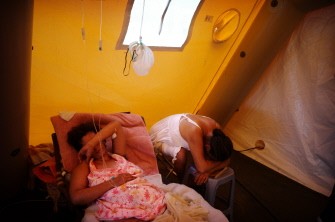WASHINGTON, Jan 26, 2010 (AFP) - Nobel peace prize winning NGO Handicap International is moving fast to help Haiti deal with a distressing new reality: huge numbers of amputees left by the powerful earthquake that rocked the country two weeks ago.
"The first plane-load of short-term DynaCast prosthetics is already in the country," said Wendy Batson, executive director of the US branch of Handicap International.
"We're setting up a database and moving in the medical equipment we need so that as soon as stumps are healed enough after surgery, we can put on DynaCast prosthetics, which last four to six months," she said.

Batson said the disabling injuries in Haiti "surpass anything we've ever seen anywhere else."
The NGO, which shared the Nobel peace prize in 1997 with the International Campaign to Ban Landmines, pulled staff from emergency and long-term programs in China and Pakistan and sent them to Haiti to help with relief efforts.
Twenty expatriates are working alongside 130 Haitians "in the remnants of the medical system and out in the neighborhoods where they identify people with serious injuries and tell them they should get medical care immediately.
"But given the devastation to the medical system, more sophisticated interventions that would allow you to save limbs can't be done, and anyone who can't in the most rudimentary way have their limb saved is having it amputated, so that infection doesn't kill them," Batson said.
Handicap International has already logged 500 amputees in Haiti on its database, and based on information it has received from other NGOs, the number of people who have had to have injured limbs cut off has exceeded the 1,000 mark in two weeks -- a rate of about 75 amputations a day.
And then there are people with serious head and spinal cord injuries sustained in the earthquake, or with burns or compound fractures that "haven't yet led to amputations," said Batson.
"Those numbers, no one's focussed on yet. We're just trying to save lives right now," she said.
The 7.0-magnitude quake on January 12 killed some 150,000 people, left close to 200,000 injured and up to one million homeless.
Given the seriousness of the injuries and the extent of the devastation, Handicap International expects to stay in Haiti for the long haul.
"The needs are now enormously greater than they were before," said Batson.
"They're going to be left with a disproportionate number of amputees per head of population, not to mention the people who are going to be left para- and quadriplegic from this.
"That's long-term; that's not short-term," she said.
For the moment, the NGO's main focus is to set up a facility to produce longer-term prosthetics for Haiti's newly disabled population. It hopes to have production up and running within months.
It has found a Haitian producer of polypropylene, a material commonly used to make prosthetics, and already has bench technicians and one certified prosthetist-orthotist on the ground in the quake-ravaged country, with another due to arrive by the end of the month.
"We are looking at where we're going to set up our production facility in Haiti to begin producing permanent limbs," said Batson.
The aim is to give amputees short-term limbs as soon as possible after surgery, "because most people with amputations, once the stump is healed, are better off with any kind of system that lets you move around," said Batson.
And when the DynaCast prosthetics reach the end of their useful lives, "We should have a production facility in place to begin looking at permanent fitting alignment," Batson said.
























